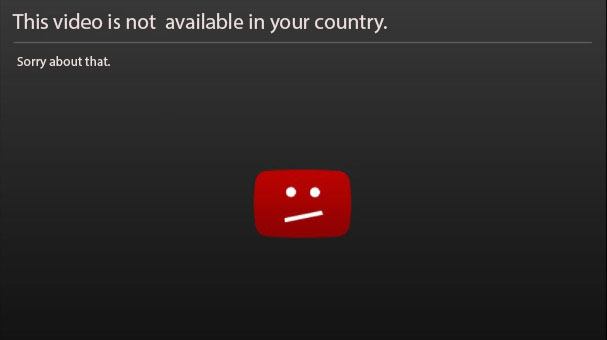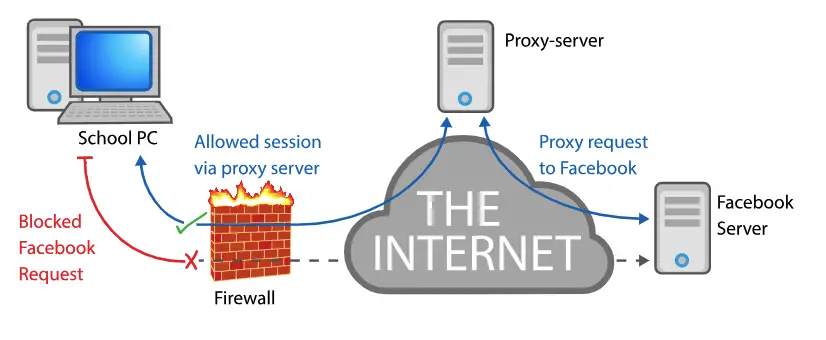Have you ever tried accessing a video only to get a message that it’s not available in your country? This frustrating error message appears because of geographical restrictions that limit content availability worldwide. Luckily, it’s easily avoidable using proxies, and this article explains how to do it.

What Are Geographical Restrictions?
Governments and private institutions set geographical restrictions to control Internet access. The most notorious example is the Great Firewall which blocks viral websites like Reddit, LinkedIn and many others in China. Other examples are streaming services. Because of copyright laws and distribution rights agreements, these companies must negotiate a deal to distribute movies and TV shows in specific regions.
That’s why Netflix has vastly different libraries, depending on your location. Statista data reveals that the difference can be as big as two thousand titles. Although the US Netflix library is not the largest, it has one of the best blockbusters exclusive to this region.
Government Internet access control is an entirely different thing. Often encountered in authoritarian countries like Russia and Iran, they are deployed to limit global information access. For example, Facebook and Instagram are banned in Russia, Twitter and adult websites are inaccessible in Iran, and Venezuela bans most independent news sites.
Some content restrictions, such as IP address monitoring or DNS blocks, are straightforward and easy to overcome. Others, like the Great China Firewall, use sophisticated techniques and require more complex solutions. Let’s take a look at them.
Sometimes, business owners who do business in a particular country, block other countries to access their websites as well.
What Are Proxies?
A proxy is any device that acts as an intermediary between the user and the Internet. In a standard online communication model, a person (called a client) sends requests to a web server. For example, when someone inputs amazon.com in a web browser, they send a request to Amazon’s servers to retrieve the website data – that’s how browsing works. The server marks the client’s IP address and provides the requested information.
As you can see, it exposes the original user IP address, which can be used to enforce geographical restrictions. After Europe launched the General Data Protection Regulation (GDPR), many US websites became inaccessible to EU users because they collect data. These websites check the user’s IP address; they deny access if it’s not from the US.
When connected to a proxy server, the client uses its IP address instead of the original. They send requests to the proxy server that forwards them to the web server handling all communication. Living in Europe, if you connect to a US proxy server, the website will see the US IP address and grant access. This is how you easily overcome geographical restrictions and get access to a more open Internet.

Different Proxy Types
Not all proxies perform equally well bypassing geo-blocks. For example, reverse proxies are designed to reduce web server overload and protect it from cyber threats. Let’s overview different proxy types regarding geo-block evasion.
Residential vs. Datacenter vs. Mobile
Datacenter proxies come from businesses that specialize in huge proxy networks. They handle thousands of servers, renting them to clients for various operations. Datacenter proxies are more often used by enterprises than casual Internet users. Compared to residential, they are much cheaper and have better uptime and connection speed. Businesses use data center proxies for market research, massive data transfers, IP obfuscation, and SEO tasks.
Because they come from data centers, these proxies are easy to identify and unfit to access geographically restricted content. The website detection system will immediately notice that the user is connected to a data center proxy and deny access if it uses geographical restrictions or blocks proxy connection.
Residential proxies come from genuine users and their devices. For example, someone agrees to share their bandwidth as a proxy server. Let’s say they are located in New York with excellent Internet access and use a laptop for browsing. You will connect to their laptop and use its IP address as a middleman. You can reach any website they can, bypassing geographical restrictions. Typically, this is done by inputting a proxy IP address and port number in your browser or device network settings.
Mobile proxy services are becoming more popular as smartphones get faster and more sophisticated. They are among the most expensive proxy types because they are much harder to detect and can overcome even the toughest geo-blocks. Mobile proxies are excellent at bypassing geo-blocks if you can spend extra, but ensure you use a reliable provider, as low-quality mobile proxies often disconnect.
| Characteristic | Residential Proxies | Datacenter Proxies | Mobile Proxies |
|---|---|---|---|
| Source | Home IP addresses | Datacenter servers | Mobile network IPs |
| IP Rotation | Usually dynamic | Usually static | Dynamic |
| Anonymity Level | Moderate | Moderate to low | Moderate to high |
| Speed | Moderate | High | Moderate to high |
| Reliability | Variable | High | Variable |
| Pricing | Moderate to high | Low to moderate | Moderate |
| Usage Restrictions | Residential use only | General use | Residential use only |
| Footprint | Lower risk of bans | Higher risk of bans | Moderate risk of bans |
Free vs. Paid
You will encounter free proxy service providers looking for reliable service. Unfortunately, free proxies often fail to meet strict quality and security demands for comfortable use.
Firstly, free proxies often lack a large server network to maintain the best possible connection speed. If you use them for streaming, you will get continuous buffering periods. Some uncompetitive free proxy services collect and sell user data to target users with ads. Lastly, hackers sometimes use free proxies to lure unsuspecting users, then steal their data or infect devices with malware.
Instead, we recommend choosing a reliable paid proxy service provider. It won’t cost much if you only require proxies to bypass geo-blocks, although you should opt for a more expensive option if you aim to bypass government censorship.
| Characteristic | Free Proxies | Paid Proxies |
|---|---|---|
| Source | Publicly available IPs | Private and premium IPs |
| IP Rotation | Limited or none | Usually dynamic or rotating |
| Anonymity Level | Low | Moderate to high |
| Speed | Slow to moderate | Moderate to high |
| Reliability | Unreliable | More reliable and stable |
| Security | Lower security | Higher security features |
| Support | Minimal or no support | Customer support available |
| Usage Restrictions | Often heavily restricted | Fewer restrictions, if any |
| Privacy | Limited or no privacy | Better privacy protection |
| Geolocation Control | Limited control | Better geolocation options |
| Blocked by Sites | Often blocked by websites | Less likely to be blocked |
| Pricing | Free | Subscription-based or one-time payment |
| User Experience | Ad-supported, potential pop-ups | Better user experience |
Is Using Proxies to Access Geo-restricted Content Legal?
Using proxies to get more streaming content or access US websites from the EU is perfectly legal as per my research but before using it, make your own research as well or get to know the cyber rules of your country. Although streaming services do their best to block proxy users, they aren’t very good at that. The best they can do is issue an error message if they identify you as a proxy user, but you can connect to a different proxy server and try again until it works.
It would be best to be cautious about using proxies in countries with tight Internet control. Although China allows tourists to use Facebook, using proxies to access politically controversial topics can get you in legal trouble. The same applies to North Korea, Venezuela, and numerous Middle Eastern countries. Reviewing the national Internet access laws before using proxies to access blocked content is the best thing you can do.
Conclusion
Using residential proxies is a straightforward and reliable way to get more open and secure Internet access. Internet surveillance is at its peak, so privacy-wise, obfuscating the original IP address is a great idea.
However, using proxies against national laws will get you in trouble. Although proxies are robust privacy-protection tools, they do not grant full online anonymity and legal immunity. But they do unblock tons of entertaining content and useful websites risk-free.







Add Comment